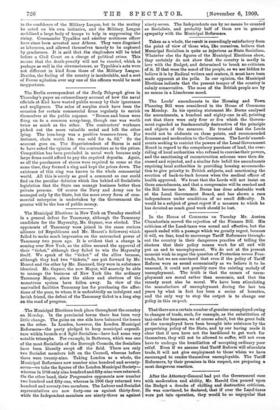The Lords' amendments to the Housing and Town Planning Bill
were considered in the House of Commons on Monday. In his opening statement Mr. Burns analysed the amendments, a hundred and eighty-one in all, pointing out that there were only four or five which the Govern- ment regarded as fundamentally destructive of the principle and objects of the measure. He trusted that the Lords would not be obdurate on these points, and recommended firmness and moderation to the Commons. The Lords' amend- ments seeking to restrict the powers of the Local Government Board in regard to the compulsory purchase of land, the over- riding of local authorities who refused to exercise their powers, and the sanctioning of reconstruction schemes were then dig._ cussed and rejected, and a similar fate befell the amendments requiring local authorities in providing housing accommoda- tion to give priority to British subjects, and sanctioning the erection of back-to-back houses when the medical officer of health approved. We trust that the Lords will not insist on these amendments, and that a compromise will be reached and the Bill become law. Mr. Burns has done admirable work at the Local Government Board, and has shown a rare independence under conditions of no small difficulty. It would be a subject of great regret if a measure to which he
has devoted so much good work should be lost -






























































 Previous page
Previous page